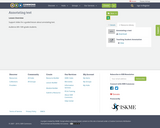
Support slides for a guided lesson about annotating text. Audience 8th-10th grade students.
- Subject:
- English Language Arts
- Material Type:
- Lesson Plan
- Author:
- Beth Jordan
- Date Added:
- 04/19/2019

Support slides for a guided lesson about annotating text. Audience 8th-10th grade students.
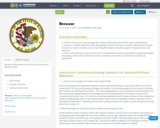
Because of Winn-Dixie by Kate DiCamillo, Instructional Exemplar (Day 1)
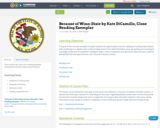
This outlines the 2-day close reading exemplar developed by Student Achievement Partners.
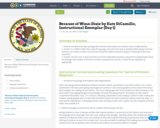
Because of Winn-Dixie by Kate DiCamillo, Instructional Exemplar (Day 1)
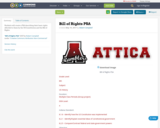
Students will create a PSA describing their basic rights afforded to them by the US Constitution and the Bill of Rights.
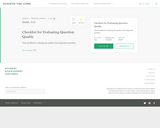
Clear checklist for evaluating the quality of text-dependent questions.
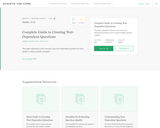
Thorough explanation of the how and why of text-dependent questions for close, analytic reading. Includes examples.
The Common Core State Standards for reading strongly focus on students gathering evidence, knowledge, and insight from what they read. Indeed, eighty to ninety percent of the Reading Standards in each grade require text dependent analysis; accordingly, aligned curriculum materials should have a similar percentage of text dependent questions.
As the name suggests, a text dependent question specifically asks a question that can only be answered by referring explicitly back to the text being read. It does not rely on any particular background information extraneous to the text nor depend on students having other experiences or knowledge; instead it privileges the text itself and what students can extract from what is before them.
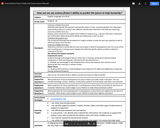
Students will learn the potential costs and benefits of social media, digital consumption, and our relationship with technology as a society in the three-week lesson. This inquiry based unit of study will answer the following questions:
Essential Question: How can we use science fiction’s ability to predict the future to help humanity?
Supportive Questions 1: What predictions of future development has science fiction accurately made in the past? This can include technology, privacy, medicine, social justice, political, environmental, education, and economic.
Supportive Question 2: What predictions for future development in contemporary science fiction are positive for the future of humanity? What factors need to begin in your lifetime to make these predictions reality?
Supportive Question 3: What predictions for future development in contemporary science fiction are negative for the future of humanity? What factors need to begin in your lifetime to stop these negative outcomes?
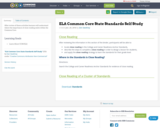
After review of these activities learners will understand where the importance of close reading exists within the Common Core.
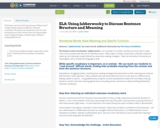
This lesson uses the Lewis Carroll poem "Jabberwocky" to help students approach difficult, unknown vocabulary. The poem uses nonsense words, but with strong structural and context clues. By using multiple close-reading strategies, students gain confidence reading difficult text.

The 11th grade learning experience consists of 7 mostly month-long units aligned to the Common Core State Standards, with available course material for teachers and students easily accessible online. Over the course of the year there is a steady progression in text complexity levels, sophistication of writing tasks, speaking and listening activities, and increased opportunities for independent and collaborative work. Rubrics and student models accompany many writing assignments.Throughout the 11th grade year, in addition to the Common Read texts that the whole class reads together, students each select an Independent Reading book and engage with peers in group Book Talks. Students move from learning the class rituals and routines and genre features of argument writing in Unit 11.1 to learning about narrative and informational genres in Unit 11.2: The American Short Story. Teacher resources provide additional materials to support each unit.

In this unit, students will take a look at the historical vision of the American Dream as put together by our Founding Fathers. They will be asked: How, if at all, has this dream changed? Is this dream your dream? First students will participate in an American Dream Convention, acting as a particular historical figure arguing for his or her vision of the American Dream, and then they will write an argument laying out and defending their personal view of what the American Dream should be.
ACCOMPLISHMENTS
Students read and annotate closely one of the documents that they feel expresses the American Dream.
Students participate in an American Dream Convention, acting as a particular historical figure arguing his or her vision of the American Dream.
Students write a paper, taking into consideration the different points of view in the documents read, answering the question “What is the American Dream now?”
Students write their own argument describing and defending their vision of what the American Dream should be.
GUIDING QUESTIONS
These questions are a guide to stimulate thinking, discussion, and writing on the themes and ideas in the unit. For complete and thoughtful answers and for meaningful discussions, students must use evidence based on careful reading of the texts.
What has been the historical vision of the American Dream?
What should the American Dream be? (What should we as individuals and as a nation aspire to?)
How would women, former slaves, and other disenfranchised groups living during the time these documents were written respond to them?
BENCHMARK ASSESSMENT: Cold Read
During this unit, on a day of your choosing, we recommend you administer a Cold Read to assess students’ reading comprehension. For this assessment, students read a text they have never seen before and then respond to multiple-choice and constructed-response questions. The assessment is not included in this course materials.

In this lesson, students will share their work with their classmates and celebrate their accomplishments.
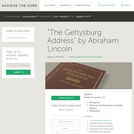
This unit has been developed to guide students and instructors in a close reading of Lincoln’s “Gettysburg Address.” The activities and actions described below follow a carefully developed set of steps that assist students in increasing their familiarity and understanding of Lincoln’s speech through a series of text dependent tasks and questions that ultimately develop college and career ready skills identified in the Common Core State Standards.
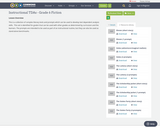
This is a collection of complex literary texts and prompts which can be used to develop text dependent analysis skills. This set is identified for grade 6 but can be used with other grades as determined by curriculum and the learners. The prompts are intended to be used as part of an instructional routine, but they can also be used as stand-alone benchmarks.
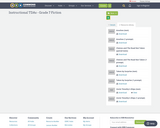
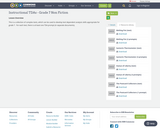
This is a collection of complex texts, which can be used to develop text dependent analysis skills appropriate for grade 7. For each text, there is at least one TDA prompt (in separate documents).
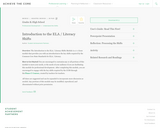
This 1-2 hour module provides participants with an introduction to the key shifts required by the Common Core State Standards for ELA / Literacy.

Contains I think, you think- sixth grade cover sheet
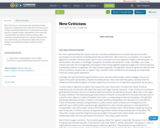
New Criticism is a movement that dominated Anglo-American academy for more than three decades, and is still has a powerful influence on contemporary critical practice, though its basic assumptions were variously contested after the advent of literary theory. New criticism is premised upon the concept of literary text as a closed entity, an autonomous object that can be studied and analyzed through a method of 'close reading'.